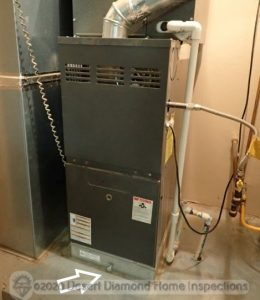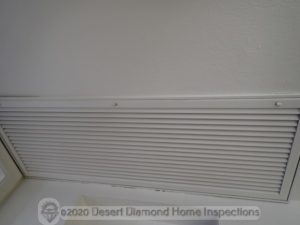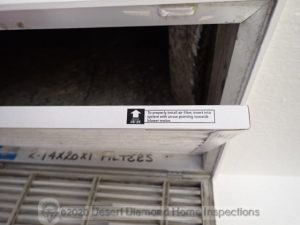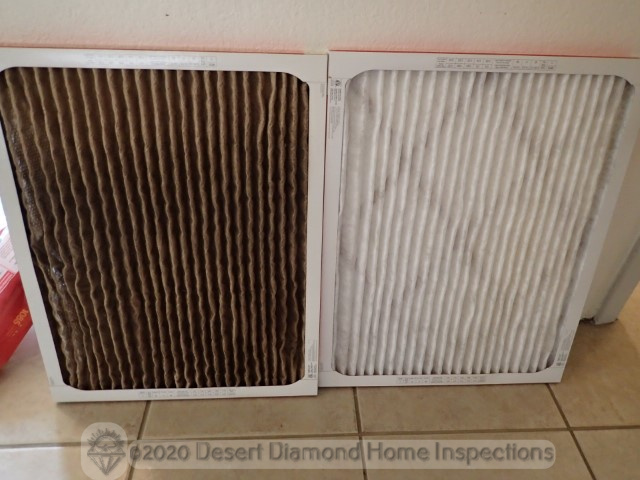HVAC maintenance is the ninth article in our series of top 10 home maintenance tips. These tips are based on our experience from inspecting homes in Tucson where we see certain issues on a regular basis. Issues that could have been prevented with some easy and affordable proactive maintenance. Proactive home maintenance helps prevent unpleasant surprises and major damage, and keeps maintenance and repair costs down. We hope you find these tips helpful and use them to keep your home in good shape.
HVAC maintenance
Our ninth home maintenance tip is about maintaining the Heating, Ventilation, and Air Conditioning (short: HVAC) system in your home. This system has two main functions: In the winter, it will blow warm air through your house to keep you warm. In the summer, it will blow cold air through your house to keep you cool. Pretty simple, right? The HVAC system is very important here in Arizona, especially in the summer time. Spending an Arizona summer in a house without air conditioning is no fun and can make even the hardiest person consider relocation to Alaska.
Regular HVAC maintenance is imperative for several extremely important reasons:
First, it prolongs the life span of the unit, potentially by quite a few years. Systems that are not maintained regularly will wear faster, work less and less efficiently, and fail earlier – period. HVAC systems are expensive. Getting several more years out of it before you have to buy a new one means more money in your pocket.
Second, it greatly reduces the chances of the system breaking right when you need it the most. Can you imagine your AC breaking in the middle of June? Now can you imagine having to wait a week before an HVAC professional can come to your house for service? Nobody wants that…
Changing the air filter
Every HVAC system has one or more air filters. The purpose of the air filter is to catch dirt and dust in the air, and prevent it from entering the HVAC system. If there was no air filter, the dirt and dust in the air would get into the system and clog the coil, reducing the efficacy of the system.
When the filter does its job, it catches dust and dirt and hair and other unpleasant stuff. Over time, the accumulating dirt slowly reduces the amount of air that can pass through the filter. If the filter is filthy and blocks the air flow, this starves the HVAC system of air and prevents it from functioning as intended. As a result, a dirty air filter causes more wear on the HVAC system, reduces the air quality in your home, and can negatively affect people with allergies or medical conditions.
This is why you have to replace the dirty filter with a clean one on a regular basis.
How to change the air filter
- First, locate your air filter – The air filter can be in a number of different locations, for example at the ceiling or a wall inside your house. It could also be at the actual HVAC system. Each house is different, so locate the filter in your house. Wherever the filter is, it is at the path of where air from inside the house returns to the HVAC system.

Air filter location at HVAC system 
Air filter in ceiling air return Tip: Depending on the age and size of your home, you might have more than one air filter. Be sure to locate all air filters so that you don’t miss one!
We inspected a house recently that had an air filter located in the hallway ceiling. Easy to see and access. It had been changed recently, was clean, and labeled with the installation date. However, we found a second air filter accessible only from within a bedroom closet wall. The access cover was covered up with boxes and personal belongings. The filter was filthy and had not been changed in eons because the homeowner didn’t know or had forgotten it existed! - Now open the compartment that contains the air filter – Again, this is different from house to house. Some air returns have little latches, some have screws, some have a cover that flips up. Find out how the one in your house opens.
- Next, remove the old filter – Usually it pulls right out. Sometimes there is a metal bracket that holds it in place. Again, this depends on the individual system.
- Note the size and type of the air filter – It is printed somewhere on the edge of the filter. Air filters come in approximately 12,397 different sizes. For example, 16x20x1. This is the width, length, and thickness of the filter. You want to make sure you buy the right size.
Depending on the filter, it might also have a MERV (Minimum Efficiency Reporting Value) rating. This rating determines how effectively the filter catches dirt, dust, and other contaminant particles.
If for whatever reason you’re not sure about the right size or MERV rating of your air filter, consult the manual for your HVAC system. What, you don’t have the manual? No problem – look at the manufacturer tag on the system and write down the manufacturer and model number. Then search online for the make, model, and the keyword “manual”. You should be able to download the manual for free from the manufacturer website. As a last resort, if you cannot find it, ask your trusted HVAC technician. He will be able to provide you with a copy. - Go to the hardware store and buy the appropriate replacement filter. A few tips:
Don’t buy the cheapest filter. They will allow more dirt and dust to pass through, and won’t last very long. As a result, you’ll have to change them more often, eliminating the “savings”. As with most things in life, you get what you pay for. Get the good quality filter. After all, you are protecting your HVAC system which costs many thousands of dollars to replace.
Get several replacement filters so that you have some in reserve and don’t have to run to the hardware store every month. - Now insert a new clean filter – Before inserting the new filter, check for an arrow that indicates air flow. Pay attention to the direction the arrow points in. Now install the filter so that the arrow points towards the path of travel of the air, towards the HVAC system.

Arrow on air filter indicating air flow direction Tip: If your air filter is located in the air return in the ceiling, turn the system on before changing the filters. The air flowing through the system will prevent the old filter from falling on your head when you open the air return. It also makes inserting the new filter much easier because the air flow will suck and hold it into place.
- Finally, close the air filter compartment – done!
If you encounter any problems with these steps, ask your trusted HVAC technician at the next service. He’ll be happy to help you.
When to change the air filter
This depends on several factors:
- Do you have kids and/or pets
- Do you like to keep doors or windows open
- Is there a lot of in/out traffic in your home?
- Does somebody in your household have allergies or medical respiratory issues?
If any of these apply, you probably should change the air filter every month. On the other hand, if it’s just one or two adults and you keep doors and windows closed, every two or three months is OK. First, check the filter every month and compare it to a clean one. If there is little to no difference, check again next month. If it looks like the photo at the beginning of this article, it’s wayyyy overdue for replacement. Either way, eventually you will get a feel for how often you should change it.
Bi-annual HVAC system service
The other HVAC maintenance task you need to perform is to call a qualified licensed HVAC professional to come out and service your HVAC system twice a year. Now, you may ask, why? Running the system for hours every day causes wear and tear. Over time, coils get dirty. Bearings wear out. Capacitors go bad. Connections come loose. Refrigerant leaks. An HVAC technician can check all these things (and more) and let you know when something is failing. After all, repairing or replacing something before it breaks will prevent the system from failing at the most inopportune time.
Most HVAC companies offer a service contract where they come out twice a year to service your system. The fee for a service call is modest compared to the inconvenience of a failed HVAC system. In addition, if you have a service contract, you often get preferential scheduling and/or a discount on parts and/or labor (depending on the company). Therefore it is really a no-brainer to make that phone call.
When
Put a reminder on your calendar to check the air filter every month.
Put another reminder on your calendar to call for HVAC service twice a year. Ideally you do this in March before it gets hot, and October before it gets cold. That way you avoid the rush of people calling when they find out the hard way that their system is not working because they didn’t maintain it.
If you do not have a good HVAC professional on speed dial, click here to find a good HVAC professional in the Tucson, AZ area.
Conclusion
Now you understand why HVAC maintenance is so important. It helps extend the lifespan of your HVAC system, reduces the risk of it failing at the worst possible time, and save you money in the long run.

